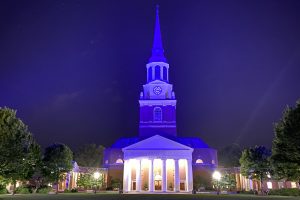If you’re still measuring the success of a congregation’s youth ministry on programs and attendance, you’re missing the boat, according to an extensive national survey by Springtide Research Institute.
The new research organization specializes in studying young people ages 13 to 25. From late 2019 into 2020, the group conducted its second national project, which surveyed opinions of 10,000 young people supplemented by 150 one-on-one interviews.
The result — The State of Religion & Young People 2020: Relational Authority — reveals three key findings important to congregations and their pastors and leaders with youth and young adults, said Josh Packard, executive director of the research organization. Packard earned a Ph.D. in sociology from Vanderbilt University and currently teaches at the University of Northern Colorado in Greeley, Colo.

Josh Packard
“Anybody can teach you how to build a better program, but the fundamental basics of what’s going on in society are shifting, and you need a different approach,” Packard said. “For a long time, the church has told itself a story that it is the central actor in the story. That is now shifting. There’s a bigger, more fundamental issue going on around you.”
Also, “If you work with young people, you need to get clear about what is your mode of delivery and what are your values. Your youth program is not your youth ministry. A lot of churches, when their ability to get together on Wednesday night went away due to COVID, they lost their youth ministry. The program was the ministry.”
In an interview, Packard highlighted three big takeaways from this year’s research — a project Springtide will continue annually, always tapping the insights of 13- to 25-year-olds at that moment. Currently, that age span covers what researchers call Gen Z.
First, “affiliated” and “unaffiliated” no longer mean what they used to mean for young people and churches.
In the past, Packard said, it was common to assume that if someone claimed “affiliation” with a church or religious tradition, that meant they adhered to a certain set of common practices, beliefs and identities. But that this is no longer necessarily the case.
“This is the most diverse generation in the history of the United States, and the world is more complicated than it’s ever been.”
“There was once a period of time when we could use the categories of affiliation and unaffiliation as proxies to tell us a whole bunch of things. We could assume some things. This is the most diverse generation in the history of the United States, and the world is more complicated than it’s ever been. We need to get rid of these categories of affiliation.”
For example, “nearly half of young people tell us they have little trust in institutions. Yet a significant percentage of young people say they are spiritual,” he noted. This is a continuation of the national trend that has introduced church leaders to the phrase “spiritual but not religious” and “nones.” Except that with young people, those societal trends get supersized.
Here are some data points to explain what he means:
- 52% of “affiliated” young people have little to no trust in organized religion.
- Nearly one-third of “affiliated” young people do not think it’s important to have a faith community.
- 1 in 5 young people who are affiliated with a religious tradition also say they don’t try to live out their religious beliefs in their daily lives.
- The unaffiliated are not uninterested in questions of God and meaning. In some cases, they may attend religious services or describe themselves as practicing religious values.
- 19% of “unaffiliated” young people report that they attend religious gatherings at least once a month.
- 38% of “unaffiliated” young people say they are religious.
- 60% of “unaffiliated” young people say they are at least slightly spiritual.
Second, trust in religious institutions is at an all-time low. “We’re in a 40-year trend of all Americans expressing declining trust in religious institutions,” Packard explained. “That is heightened among young adults 13- to 25-years-old.”
Rather than cause church leaders to dismay, that data point ought to offer some hope, he added. “It’s not that the church is broken, it’s that young people don’t trust institutions across the board. For many there is a religious component to that, but for many it’s not religion they’re rejecting, its institutions.”
“It’s not that the church is broken, it’s that young people don’t trust institutions across the board.”
In other words, churches and synagogues and mosques are not alone in this trend, which not only hasn’t changed but isn’t slowing down, he added. “Trust in basic bedrock institutions, in some surveys they’re down to single digits. It’s no surprise then that we see young people not want to affiliate with religious institutions because they don’t want to affiliate with any institutions.
“I would take a great deal of comfort in this if I worked in a religious institution,” he continued. “It means we didn’t break this, so we can’t possibly fix this on our own. The change in diagnosis means we don’t have to look inward and figure out what we’re doing wrong. We just have to change.”
There’s a simple truth to abide by on this, Packard said: “In this new world in which people don’t trust institutions, the more you lean into your institution as the spearhead of the approach, the less effective you’re going to be. When you come to a young person and say, ‘I’m Pastor So and So, let me tell you about a better way to live,’ no one cares that you’re a pastor.”
In other words, leading with your religious or institutional identity is exactly the wrong way to get young people to pay attention to what you say.
“If you really want to have some influence in the life of a young person, you have to provide care, transparency, integrity.”
Third, expertise alone is not enough to get young people to care. “They told us pretty clearly, if you really want to have some influence in the life of a young person, you have to provide care, transparency, integrity,” Packard said. “They think you represent and care about the institution you come from until you demonstrate otherwise. Until you demonstrate that you’re after their best interest, you’re not going to make much difference.”
Put more starkly, young people told the surveyors: “We don’t want adults to be our friends; we have enough friends. We want adults to be our guides, our mentors.”
That still demands relationships, though. “Trusted adults in general and religious leaders in particular have an opportunity to meet young people — whether affiliated, unaffiliated or in-between — outside the spaces traditionally associated with spiritual and religious formation, where young people are nonetheless navigating questions of identity, community and meaning,” Packard said.
The key to success, he suggested, is learning to listen.
“It can be really hard to listen,” Packard acknowledged. “You just want to correct them. But if you try to correct before you’ve built up the trust, it won’t take. It’s important to have an open posture when you’re listening — physically having an open posture.”
He offered two other tips for adults seeking to engage young people in meaningful conversation. The first is to be vulnerable yourself. “When older people share something, it opens a space where young people feel like they need to share something. If you say, ‘I struggle to understand these two passages, … it opens up a space for the young person to say, ‘I struggle with that too.’”
The second tip is not to stop with listening only one time. When adults are in conversation with young people who share their story, it’s good to ask at least one follow-up question, he advised. “It can be as simple as, ‘Tell me more about that.’ The point is that you demonstrate that you were listening and want to know more.”
 In sum, Packard explained: “We felt like 2020 was really the year you could point back to and say of institutional programmatic responses, the time has passed. Relationships is really where it’s at right now.”
In sum, Packard explained: “We felt like 2020 was really the year you could point back to and say of institutional programmatic responses, the time has passed. Relationships is really where it’s at right now.”
And now armed with reams of data, Springtide hopes to do more than dump numbers on weary church leaders, he said. “We want to be useful, not just interesting.”
To that end, the full report includes data, interpretation and practical tools for church leaders.
The message of this report needs to reach beyond youth ministers and other youth leaders, however, because the people who hold the power in church structures may still be relying on the old metrics, he added. “We have to find ways to communicate why (this data is) impactful to our bosses. We can always track how many people showed up or how much money was given. But our metrics need to change.”
Related article:








































































